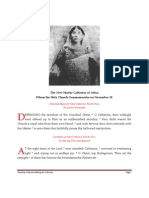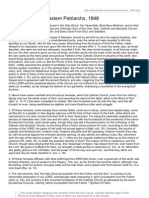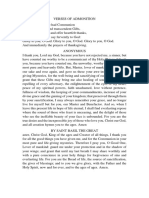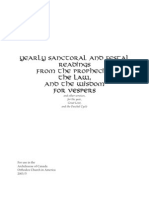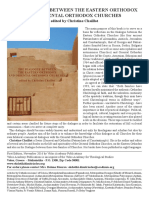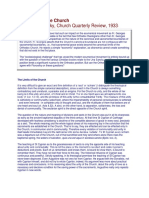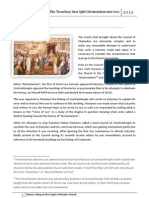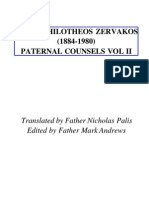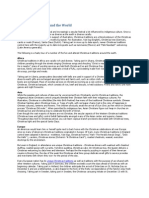0 ratings0% found this document useful (0 votes)
56 viewsThe Epitomes of The Mystagogy of The: Holy Spirit by Saint Photius The Great
The Epitomes of The Mystagogy of The: Holy Spirit by Saint Photius The Great
Uploaded by
matrik881. Saint Photius argues that the Holy Spirit proceeds from the Father alone, not from both the Father and the Son, based on several reasons from scripture and tradition.
2. He cites passages from scripture and the writings of early Church fathers to support the position that the Holy Spirit's procession is from the Father alone in order to avoid undermining the monarchy of the Father.
3. Saint Photius asserts that saying the Holy Spirit proceeds from both the Father and the Son would imply two causes or principles and introduce confusion, contradicting the synods and the tradition of the early Church.
Copyright:
© All Rights Reserved
Available Formats
Download as DOCX, PDF, TXT or read online from Scribd
The Epitomes of The Mystagogy of The: Holy Spirit by Saint Photius The Great
The Epitomes of The Mystagogy of The: Holy Spirit by Saint Photius The Great
Uploaded by
matrik880 ratings0% found this document useful (0 votes)
56 views3 pages1. Saint Photius argues that the Holy Spirit proceeds from the Father alone, not from both the Father and the Son, based on several reasons from scripture and tradition.
2. He cites passages from scripture and the writings of early Church fathers to support the position that the Holy Spirit's procession is from the Father alone in order to avoid undermining the monarchy of the Father.
3. Saint Photius asserts that saying the Holy Spirit proceeds from both the Father and the Son would imply two causes or principles and introduce confusion, contradicting the synods and the tradition of the early Church.
Original Description:
ty
Original Title
Reo Cities 22
Copyright
© © All Rights Reserved
Available Formats
DOCX, PDF, TXT or read online from Scribd
Share this document
Did you find this document useful?
Is this content inappropriate?
1. Saint Photius argues that the Holy Spirit proceeds from the Father alone, not from both the Father and the Son, based on several reasons from scripture and tradition.
2. He cites passages from scripture and the writings of early Church fathers to support the position that the Holy Spirit's procession is from the Father alone in order to avoid undermining the monarchy of the Father.
3. Saint Photius asserts that saying the Holy Spirit proceeds from both the Father and the Son would imply two causes or principles and introduce confusion, contradicting the synods and the tradition of the early Church.
Copyright:
© All Rights Reserved
Available Formats
Download as DOCX, PDF, TXT or read online from Scribd
Download as docx, pdf, or txt
0 ratings0% found this document useful (0 votes)
56 views3 pagesThe Epitomes of The Mystagogy of The: Holy Spirit by Saint Photius The Great
The Epitomes of The Mystagogy of The: Holy Spirit by Saint Photius The Great
Uploaded by
matrik881. Saint Photius argues that the Holy Spirit proceeds from the Father alone, not from both the Father and the Son, based on several reasons from scripture and tradition.
2. He cites passages from scripture and the writings of early Church fathers to support the position that the Holy Spirit's procession is from the Father alone in order to avoid undermining the monarchy of the Father.
3. Saint Photius asserts that saying the Holy Spirit proceeds from both the Father and the Son would imply two causes or principles and introduce confusion, contradicting the synods and the tradition of the early Church.
Copyright:
© All Rights Reserved
Available Formats
Download as DOCX, PDF, TXT or read online from Scribd
Download as docx, pdf, or txt
You are on page 1of 3
The Epitomes of the Mystagogy of the
Holy Spirit by Saint Photius the Great
Chapters of Patriarch Photius against the followers of Old Rome,
showing that the Holy Spirit proceeds from the Father alone, and not from the Son.
1. If the Spirit is indeed simple, but proceeds from the Father and the Son, these two
would certainly be considered one hypostasis, and there would be introduced here
a Sabellian fusion, or better to say, a semi-Sabellian fusion.
2. If indeed the Holy Spirit does proceed from the Father and the Son, He would be
altogether double and composite. If the Holy Spirit is ascribed to two principles,
where will the much-hymned monarchy be?
3. If the Father and the Son both originate the Spirit, the Father will be both the
direct and indirect originator of the Spirit on account of His proceeding also from
the Son.
4. Certainly, if the procession of the Holy Spirit from the Father is perfect, then that
from the Son is superfluous.
5. If the Son has the property of originating the Spirit like the Father, the property of
origination will be common to both. But how will the property be shared in
common? If by opposition, will not one destroy the other? For contraries are
destructive of one another. If by divergence, then part of the Spirit will proceed in
one way and part in another, and He will be composed of unequal parts.
6. If, indeed, both the Son and the Spirit have come forth from one cause, namely
the Father, and the Son again originates the Spirit, then the Spirit should also
originate the Son. For the Father and Originator brought forth both with equal
honour.
7. If, indeed, the Son does share with the Father in originating the Holy Spirit, then
the Holy Spirit will also share in it, for all that the Father has in common with the
Son, He also has in common with the Holy Spirit. Hence He will be at the same
time cause and caused, which thing is more monstrous than the fables of the
[pagan] Greeks.
8. If the Son has the power of origination, but the Spirit is denied it, He is inferior in
power to the Son, which was the insanity of Macedonius.
9. They allege as an excuse, however, that Ambrose wrote thus in his treatises
concerning the subject, as did also Augustine and Jerome. One must say in
defence of these men that perhaps the Pneumatomachians corrupted their
writings, or perhaps they spoke according to the tactics used by the great Basil,
who for a time refrained from preaching the divinity of the All-Holy Spirit, or
perhaps they, since they were only human, had been led astray from sound
theology; for many great men, like Dionysius of Alexandria, Methodius of Patara
and Pierios, Pamphilius, Theognostus, and Irenaeus of Lyons with his disciple
Hippolytus, have suffered so in certain things. For we do not accept some of their
statements though we greatly admire the rest.
10. So Ambrose, Augustine, and Jerome, said what the Latins claim; but the hierarchs
of the Seven Synods did not. All the synods in succession confirmed the
definition of our faith. The leaders and lights of the Church of Old Rome agreed
with them without any contradiction and decreed that it was not permitted to add
or subtract anything from the aforesaid definition of the faith, and that he who
dared to do so should absolutely be cast out of the Church.
11. Divine Gregory the Dialogist, who flourished not long after the Sixth Synod,
preached and wrote in Latin that the Holy Spirit proceeds from the Father alone.
Zacharias, 165 years later, translated the Dialogues into Greek and said, the
Paraclete Spirit, proceeds from the Father and abides in the Son; for he had been
taught this by the Forerunner, who saw the Spirit descending like a dove and
abiding upon Him.
12. Leo and Benedict, great hierarchs of Old Rome in later times, decreed that the
Symbol of Faith be recited in Greek at the mystical rites in Old Rome and in the
other churches subject to her, lest the inadequacy of Latin furnish an occasion for
blasphemy. This Leo, when he had opened the treasury of the Apostolic Church
of Old Rome, brought forth two shields which had been preserved among the
other sacred heirlooms and which were engraved with the pious exposition of the
Faith in Greek letters and words [St Photius was mistaken; the words were
engraved in Greek and Latin], and which he ordered to be read before all the
people of Old Rome. Up to the time of the pious patriarch of New Rome Sergius,
the hierarchs of Old Rome sent confirmatory letters of their belief at the
beginning of their high priesthood to all the patriarchal sees, and in these letters
they inscribed the Symbol of Faith without any variation.
13. But what need is there to say much? The Son and Master reveals that the Spirit
proceeds from the Father; and likewise the great Paul declares, saying, But though
we, or an angel from heaven, preach any other Gospel unto you other than that
which we have preached unto you, let him be anathema. And who will ask for
another teacher unless he be plainly insane?
From another portion of the same work from a different manuscript:
9. When David said, By the Spirit of His mouth, he taught also that the Spirit
proceeds from the Father alone, since he applies the phrase of His mouth to the
Father, not to the Son, in order that he might destroy by anticipation the
blasphemy of those who hold the Spirit proceeds also from the Son.
10. In all other cases, procession denotes simple egress, as when it is said in the
Psalms, He went forth and spoke in a like manner. [Psalm 40:6] But the
procession of the Holy Spirit from the Father does not signify simply egress,
which is accidental, coming to pass and then ceasing, but it is an essential and
natural procession, signifying the mode of being and declaring the subsistence of
the Holy Spirit, Who is not by generation, as is the Son, but by procession, in His
own proper manner. For the characteristic property of the Son is to be begotten
by nature from the Father, but the characteristic property of the Holy Spirit is to
proceed by nature from the Father. They differ from each other only thus, namely,
in the characteristic property of subsistence, while in other respects they are one
in essence, in nature, in dignity, in power, and, to put it simply, one in everything
else, both with the Father and with each other. How then do you say the Holy
Spirit proceeds from the Father and from the Son? If as cause, then there are two
causes and two principles (Father and Son), and you are advocating a dyarchy
rather than a monarchy; but it is not our task to speak about the many absurdities
following from this belief. However, if the Spirit proceeds in another way, as if
from the mutual linking by reason of their reciprocal indwelling and interchange
of the other properties, and, to speak simply, proceeds as if being sent, then you
are sound in your understanding. For just as the Father sends the Son, so does
the Son send the Spirit. The Son says, But when the Paraclete is come, whom I
will send unto you from the Father, the Spirit of truth which proceeds from the
Father, He shall witness of Me. Nevertheless, you err in another respect: first, in
changing and falsifying through this addition the exposition of faith confirmed by
the Seven Synods -- and no one but you has done it! -- and secondly, that which
you interpolate between the two phrases and which we are accustomed to call a
conjunction, implies the meaning of equal procession from both the Father and
the Son, even though you might understand the procession from the Son in
another way, just as we said above. One ought, however, not only to think
correctly, but also not to scandalise others. For if he who gives scandal to one
person has been judged worthy of a fearful punishment, according to the Gospels,
what punishment will they deserve who have scandalised almost the entire world?
11. When God the Son was speaking concerning the Holy Spirit, He said not once, but
twice in the course of the same speech that the Holy Spirit is from the Father.
Why did He not say, and from Me? Our opponents reply that he was speaking
humbly as a man; but we, answering quickly, convict them at once of a lie. The
words, Whom I will send unto you, were not spoken as man, but rather as God;
for a man does not send God, if the Holy Spirit is indeed God. Therefore, twice
He said from the Father in order to confirm such a sublime utterance and to stop
the mouths of those who in the future would say that the Spirit proceeds from the
Son. This argument was propounded by the acumen of the very wise emperor, for
he used it when he disputed with the bishop of Milan. [A note in the Latin text
indicates the emperor was Alexius Comnenos and the bishop of Milan was Peter,
the year 1116.]
Validated as HTML 4.01 Transitional before Geocities got hold of it!
You might also like
- The RudderDocument2 pagesThe Rudderpgkoutsoukos_7802726No ratings yet
- Lessons: by Ps Johnny Sato GallosDocument19 pagesLessons: by Ps Johnny Sato GallosLito Gatarin100% (2)
- The Iconography of Lot and His Daughters in Sixteenth-Century European Art. An OrientationDocument22 pagesThe Iconography of Lot and His Daughters in Sixteenth-Century European Art. An OrientationAndrea A. M. GattiNo ratings yet
- Bogorodica I Mitarstva (Na Engleskom) Dr. Adnan TrabulsiDocument27 pagesBogorodica I Mitarstva (Na Engleskom) Dr. Adnan TrabulsiavaMotivatorijeNo ratings yet
- 15.1 New Martyr Catherine of AtticaDocument6 pages15.1 New Martyr Catherine of Atticaaeons-ro100% (1)
- 21 Century Literature From The PhilippinesDocument27 pages21 Century Literature From The PhilippinesKyla Aragon Bersalona25% (4)
- E2d029barnes PDFDocument41 pagesE2d029barnes PDFLeonard Enkeleida DokaNo ratings yet
- Encyclical of The Eastern Patriarchs 1848Document12 pagesEncyclical of The Eastern Patriarchs 1848joelhaas100% (1)
- Canons of The 7 Ecumenical Councils - The RudderDocument213 pagesCanons of The 7 Ecumenical Councils - The Rudderamdedagne12No ratings yet
- John Wesley and Eastern Orthodoxy - Influences Convergences and DDocument26 pagesJohn Wesley and Eastern Orthodoxy - Influences Convergences and DKovács Zoltán MihályNo ratings yet
- Eologie Rtodoxă: Analele Ştiinţifice ALE Universităţii Alexandru Ioan Cuza" Din Iaşi (Serie Nouă)Document15 pagesEologie Rtodoxă: Analele Ştiinţifice ALE Universităţii Alexandru Ioan Cuza" Din Iaşi (Serie Nouă)gabi mNo ratings yet
- The Mystery of Knowledge: by St. Justin PopovichDocument3 pagesThe Mystery of Knowledge: by St. Justin PopovichCostaNo ratings yet
- St. Justin Popovich-The God-ManDocument2 pagesSt. Justin Popovich-The God-ManSandor BronnNo ratings yet
- CEMES Presentation On Deaconesses-1Document24 pagesCEMES Presentation On Deaconesses-1Ioannis LotsiosNo ratings yet
- Peter Damian FILIOQUE Procession Greeks Latins CreedDocument1 pagePeter Damian FILIOQUE Procession Greeks Latins CreedPeter Brandt-SorheimNo ratings yet
- The Synodikon On The Holy SpiritDocument12 pagesThe Synodikon On The Holy SpiritAaron Anderson100% (1)
- St. Makarios of Corinth PDFDocument2 pagesSt. Makarios of Corinth PDFkimonthNo ratings yet
- Orthodox Thanksgiving Prayers After CommunionDocument3 pagesOrthodox Thanksgiving Prayers After CommunionmichaelspanouNo ratings yet
- Anastasius of Sinai Concerning The Holy Fathers in SinaiDocument14 pagesAnastasius of Sinai Concerning The Holy Fathers in SinaiChaka AdamsNo ratings yet
- (The Faith Series) Clark Carlton - The Life - The Orthodox Doctrine of Salvation-Regina Orthodox Press (2001)Document196 pages(The Faith Series) Clark Carlton - The Life - The Orthodox Doctrine of Salvation-Regina Orthodox Press (2001)Željko ĐurićNo ratings yet
- The Rudder Pedalion Vol I Book PreviewDocument50 pagesThe Rudder Pedalion Vol I Book PreviewJohn AndrewNo ratings yet
- Maxim Vasiljevic (ΘΕΟΛΟΓΙΑ 01-2010, σελ. 77-98)Document22 pagesMaxim Vasiljevic (ΘΕΟΛΟΓΙΑ 01-2010, σελ. 77-98)ivanimajaNo ratings yet
- ST Nikodemos On The Sacramental MysteriesDocument16 pagesST Nikodemos On The Sacramental MysteriesSancta Maria ServusNo ratings yet
- The Exercise of Primacy in The Church: An Orthodox Theological PerspectiveDocument21 pagesThe Exercise of Primacy in The Church: An Orthodox Theological PerspectiveGuramios100% (1)
- Man's Deification II (Shenouda III)Document33 pagesMan's Deification II (Shenouda III)Benedicto Andres González Vargas100% (1)
- Parousia and LiturgyDocument17 pagesParousia and LiturgyRosa Osborn100% (1)
- Yearly ReadingsDocument242 pagesYearly ReadingsIon CretuNo ratings yet
- Reason and Faith Revisited: Under The Auspices of The Wisconsin-Alpha Chapter of Phi Sigma TauDocument55 pagesReason and Faith Revisited: Under The Auspices of The Wisconsin-Alpha Chapter of Phi Sigma TauAbe BillNo ratings yet
- Tabor Light: 1 in Eastern OrthodoxyDocument5 pagesTabor Light: 1 in Eastern Orthodoxyj.miguel593515100% (1)
- Job Getcha, Reding Bible in SF Andrew CanonDocument14 pagesJob Getcha, Reding Bible in SF Andrew Canonstelianpascatusa0% (1)
- Livre Christine ChaillotDocument1 pageLivre Christine ChaillotPaul ionasanuNo ratings yet
- English 1Document196 pagesEnglish 1katanixis blogspotNo ratings yet
- Reply From Patriarch Bartholomew To Patriarch Alexis - 1995Document6 pagesReply From Patriarch Bartholomew To Patriarch Alexis - 1995Panagiotis Andriopoulos100% (2)
- Prayer - St. Simeon The New TheologianDocument1 pagePrayer - St. Simeon The New Theologianbob@gerber.orgNo ratings yet
- Georges Florovsky, The Limits of The Church, 1933Document7 pagesGeorges Florovsky, The Limits of The Church, 1933Constantin BalasoiuNo ratings yet
- Filioque ReviewDocument2 pagesFilioque ReviewViorel ComanNo ratings yet
- St. Gregory Palamas: Traditionalist or Innovator?Document18 pagesSt. Gregory Palamas: Traditionalist or Innovator?jckstraw72No ratings yet
- Bram Roosen, Peter Van Deun - The Literary Legacy of Byzantium (Studies in Byzantine History and Civilization, Book 15) (Retail)Document570 pagesBram Roosen, Peter Van Deun - The Literary Legacy of Byzantium (Studies in Byzantine History and Civilization, Book 15) (Retail)Петр ПашковNo ratings yet
- Florovsky - The Authority of The Ancient Councils and The Tradition of The FathersDocument10 pagesFlorovsky - The Authority of The Ancient Councils and The Tradition of The FathersJim BobNo ratings yet
- Chalcedon - The Treachery That Split Christendom Into TwoDocument19 pagesChalcedon - The Treachery That Split Christendom Into TwoSynod TrulloNo ratings yet
- Basil The Great Thought and InvolvementDocument7 pagesBasil The Great Thought and InvolvementRh2223dbNo ratings yet
- Against RomanidesDocument110 pagesAgainst Romanidesiraklis sidiropoulosNo ratings yet
- A Critique of Old Calendarist EcclesiologyDocument57 pagesA Critique of Old Calendarist EcclesiologySancta Maria ServusNo ratings yet
- Through The Pages of The Theological Works of Archimandrite Justin PopovicDocument11 pagesThrough The Pages of The Theological Works of Archimandrite Justin PopovicCostaNo ratings yet
- Booklet What Is The Difference Between Orthodoxy and Western ConfessionsDocument14 pagesBooklet What Is The Difference Between Orthodoxy and Western ConfessionsMaxNo ratings yet
- St. Luke The Evangelist: Greek Orthodox ChurchDocument4 pagesSt. Luke The Evangelist: Greek Orthodox ChurchnewromeNo ratings yet
- 2018 - 13 Nov - ST John Chrysostom - Matdivlit HymnsDocument10 pages2018 - 13 Nov - ST John Chrysostom - Matdivlit HymnsMarguerite PaizisNo ratings yet
- Augustine in ByzantiumDocument29 pagesAugustine in ByzantiumDrHouse Mk100% (1)
- Awake Sleeper-Part TwoDocument22 pagesAwake Sleeper-Part Twovargus120% (1)
- What Is The Meaning of The Divine LiturgyDocument13 pagesWhat Is The Meaning of The Divine LiturgyjiorgosNo ratings yet
- EKFONESIS - Holy Trinity Greek Orthodox ChurchDocument28 pagesEKFONESIS - Holy Trinity Greek Orthodox Churchsannicolas1952100% (1)
- Communion Spoon - SkaltsisDocument16 pagesCommunion Spoon - SkaltsisIoannis LotsiosNo ratings yet
- Byzantine Office 1105Document255 pagesByzantine Office 1105Michael LoftonNo ratings yet
- Philotheos Zervakos Paternal CounselsDocument18 pagesPhilotheos Zervakos Paternal CounselsturistNo ratings yet
- The Letters of Bishop Basil of Caesarea - Instruments of CommunionDocument292 pagesThe Letters of Bishop Basil of Caesarea - Instruments of CommunionAnonymous N2BV4KWS100% (2)
- 2016 - 8 Nov-Holy Archangels-Festal Matins & Div Lit HymnsDocument8 pages2016 - 8 Nov-Holy Archangels-Festal Matins & Div Lit HymnsMarguerite PaizisNo ratings yet
- Book of Hours ExplanationDocument16 pagesBook of Hours ExplanationherrkapellanNo ratings yet
- 1987 Letter Monk Ephraim To PolychroniosDocument14 pages1987 Letter Monk Ephraim To PolychroniosHibernoSlavNo ratings yet
- SobECR 1979-2010 TOC PDFDocument66 pagesSobECR 1979-2010 TOC PDFSancta Maria ServusNo ratings yet
- Faith, the Fount of Exegesis: The Interpretation of Scripture in the Light of the History of Research on the Old TestamentFrom EverandFaith, the Fount of Exegesis: The Interpretation of Scripture in the Light of the History of Research on the Old TestamentRating: 4 out of 5 stars4/5 (2)
- The Life of Bishoi: The Greek, Arabic, Syriac, and Ethiopic LivesFrom EverandThe Life of Bishoi: The Greek, Arabic, Syriac, and Ethiopic LivesNo ratings yet
- Bible and Poetry in Late Antique Mesopotamia: Ephrem's Hymns on FaithFrom EverandBible and Poetry in Late Antique Mesopotamia: Ephrem's Hymns on FaithNo ratings yet
- Cholesterol FactsDocument1 pageCholesterol Factsmatrik88No ratings yet
- Syn-Odical Ontology Maximus The - UnknownDocument38 pagesSyn-Odical Ontology Maximus The - Unknownmatrik88No ratings yet
- Reis 01-08Document6 pagesReis 01-08matrik88No ratings yet
- $002fj$002fress.2015.7.issue 2$002fress 2015 0015$002fress 2015 0015Document13 pages$002fj$002fress.2015.7.issue 2$002fress 2015 0015$002fress 2015 0015matrik88No ratings yet
- Religions 05 01017 (Religions MDPI - Com)Document20 pagesReligions 05 01017 (Religions MDPI - Com)matrik88No ratings yet
- Chan Biblical Materials Cultural DiversityDocument14 pagesChan Biblical Materials Cultural Diversitymatrik88100% (1)
- Why Did God Become Man?: The Archetype of Humanity Is The Incarnate WordDocument12 pagesWhy Did God Become Man?: The Archetype of Humanity Is The Incarnate Wordmatrik88No ratings yet
- Archimandrite Justin Popovich8Document5 pagesArchimandrite Justin Popovich8matrik88No ratings yet
- SeedsDocument16 pagesSeedsmatrik88No ratings yet
- Religions 05 01017 (Religions MDPI - Com)Document20 pagesReligions 05 01017 (Religions MDPI - Com)matrik88No ratings yet
- Life After DeathDocument27 pagesLife After Deathmatrik88No ratings yet
- Road To Emmaus: Help Support JournalDocument3 pagesRoad To Emmaus: Help Support Journalmatrik88No ratings yet
- Excerpts From "The History of The Council of Florence" by Ivan N. Ostroumov. Translated From The Russian. by Boris Popoff.Document72 pagesExcerpts From "The History of The Council of Florence" by Ivan N. Ostroumov. Translated From The Russian. by Boris Popoff.Иоанн ДойгNo ratings yet
- "Orthodoxy and The Religion of The Future": by Fr. Seraphim RoseDocument31 pages"Orthodoxy and The Religion of The Future": by Fr. Seraphim Rosematrik88No ratings yet
- Jaroslav Skira Creation and Incarnation in Florovsky and Zizioulas Θεολογία 4 2010Document20 pagesJaroslav Skira Creation and Incarnation in Florovsky and Zizioulas Θεολογία 4 2010matrik88No ratings yet
- Gender StudiesDocument42 pagesGender Studiesmatrik88No ratings yet
- 2705 PDFDocument8 pages2705 PDFmatrik88No ratings yet
- Theorthodoxchristian FinlandDocument1 pageTheorthodoxchristian Finlandmatrik88No ratings yet
- 00 Early Xianity0-843 SyllabusDocument11 pages00 Early Xianity0-843 Syllabusmatrik88No ratings yet
- SE Praise Lyrics 2018 4 Manang Aira VersionDocument47 pagesSE Praise Lyrics 2018 4 Manang Aira VersionMichelle YapNo ratings yet
- Solomon & 666Document9 pagesSolomon & 666Thandeka MoyoNo ratings yet
- The 1000 Songs of SolomonDocument6 pagesThe 1000 Songs of SolomonEliShoneNo ratings yet
- 2013 - 22 June - Saturday of The Souls - PentecostDocument10 pages2013 - 22 June - Saturday of The Souls - PentecostMarguerite PaizisNo ratings yet
- Rent HeavensDocument0 pagesRent HeavensVictor BritoNo ratings yet
- Orlah and 4th YearDocument2 pagesOrlah and 4th YearRabbi Benyomin Hoffman100% (1)
- Re 2046 Questions 10-12centralDocument52 pagesRe 2046 Questions 10-12centralstanslous ngosaNo ratings yet
- Gregorio Allegri: 2 The MiserereDocument3 pagesGregorio Allegri: 2 The MiserereJason TiongcoNo ratings yet
- The General Roman CalendarDocument17 pagesThe General Roman Calendargentz1985No ratings yet
- Christmas From Around The WorldDocument2 pagesChristmas From Around The Worlddavidjohn775No ratings yet
- The 7 Sayings From The Cross: Tim BenchDocument26 pagesThe 7 Sayings From The Cross: Tim BenchRhea Mae AmitNo ratings yet
- Lessons in Looking Krzysztof Kieslowski PDFDocument16 pagesLessons in Looking Krzysztof Kieslowski PDFLaura SalazarNo ratings yet
- TQ - CVL 1 TQ 1st QTRDocument5 pagesTQ - CVL 1 TQ 1st QTRSiiJuliusKhoNo ratings yet
- Intro To Old Testament Ot101 Course Outline 2023Document4 pagesIntro To Old Testament Ot101 Course Outline 2023LEARNIAS MKONDONo ratings yet
- Quetzalcoatl JesusDocument14 pagesQuetzalcoatl JesusRoberto Riquelme100% (2)
- The Battle Is The Lord'sDocument32 pagesThe Battle Is The Lord'sTeddieAparecioDumalaoronJr.No ratings yet
- TWR Jan 2008Document24 pagesTWR Jan 2008rh7771100% (1)
- 356 Dolce SentireDocument17 pages356 Dolce SentireFausto Chinaski VillaNo ratings yet
- Follow Me GameDocument14 pagesFollow Me GameHenry GacostaNo ratings yet
- Philippine Literature: Manuel S. Enverga University Foundation Catanauan, IncDocument2 pagesPhilippine Literature: Manuel S. Enverga University Foundation Catanauan, Incanir100% (1)
- Student's STUDY GUIDE Apologetics Chapter 18 Exam - 2023-2024Document5 pagesStudent's STUDY GUIDE Apologetics Chapter 18 Exam - 2023-2024casey.croninNo ratings yet
- The Modern Rationalist October 2017Document35 pagesThe Modern Rationalist October 2017paufabra100% (1)
- Seeker of Christ Essay 1Document5 pagesSeeker of Christ Essay 1api-650952630No ratings yet
- Songs With ChordDocument4 pagesSongs With ChordWec Imm Prayer MeetingNo ratings yet
- One Year Chronological Bible Reading PlanDocument19 pagesOne Year Chronological Bible Reading Planlionheartedmissions100% (2)
- Ransom PortisDocument2 pagesRansom PortisMargaret ElwellNo ratings yet
- How To Pray The RosaryDocument1 pageHow To Pray The RosaryLin Tik50% (2)




